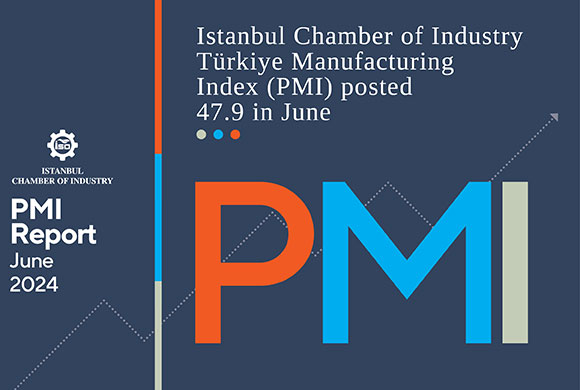News
ICI Released June 2024 Türkiye Manufacturing PMI and Türkiye Sector PMI Report
- 01.07.2024
- News

At 47.9 in June, the headline PMI was down from 48.4 in May and below the 50.0 no-change mark for the third consecutive month. Weak demand conditions remained a key feature of the sector, causing further slowdowns in both new orders and production. Output moderated for the third month running and at a solid pace, albeit one that was slightly softer than in the previous month. The slowdown in new orders meanwhile was the sharpest of the year, while the selling price inflation was the softest in four-and-a-half years.
According to the Istanbul Chamber of Industry Türkiye Sectoral PMI report, among the ten sectors monitored under the survey, the number of those able to increase new orders fell from three in May to two in June. Three out of the ten sectors reduced their selling prices, while input cost inflation decreased in general. Workforce numbers eased in all sectors except machinery and metal products as workloads decreased.
The June 2024 survey of Istanbul Chamber of Industry (ICI) Türkiye Manufacturing PMI (Purchasing Managers’ Index), which is the fastest and reliable reference accepted in manufacturing industry performance of the economic growth was released. According to the results of the survey where any figure greater than 50.0 indicates overall improvement of the sector, the headline PMI posted 47.9 in June, down from 48.4 in May and below the 50.0 no-change mark for the third consecutive month. As such, the index signalled a modest easing of business conditions in the Turkish manufacturing sector, and one that was the most pronounced in 2024 so far.
SLOWDOWN IN NEW EXPORT ORDERS MODERATED
Weak demand conditions remained a key feature of the sectors, causing further slowdowns in both new orders and production. Output moderated for the third month running and at a solid pace, albeit one that was slightly softer than in the previous month. The slowdown in new orders meanwhile was greater than that seen in May amid reports of weakness in both domestic and export markets. That said, the moderation in new business from abroad was less marked than for total new orders.
DELAYS IN SEA TRANSPORTATION LENGTHENED DELIVERY TIMES
Lower workloads meant that manufacturers scaled back their employment and purchasing activity again in June, and at sharper rates than in the previous survey period. Workforce numbers eased to the largest degree since October 2022. For the fifth month running, the rate of input cost inflation slowed in June, with the latest rise in input prices the weakest since May 2023. Where purchasing costs increased, panellists mentioned higher prices related to raw materials and sea transportation, plus currency weakness. The pace at which firms raised their own selling prices also softened and was the slowest in four-and-a-half years amid weaker cost inflation and subdued client demand. Finally, delays due to sea transportation issues, particularly as a result of disruption in the Red Sea, caused a further lengthening of suppliers' delivery times.
Commenting on the Istanbul Chamber of Industry Türkiye Manufacturing PMI survey data, Andrew Harker, Economics Director at S&P Global Market Intelligence, said: "The sustained period of muted demand is starting to be more keenly felt in the manufacturing labour market, with Turkish firms showing a reluctance to replace departing staff and thus scaling back employment to the largest degree since October 2022. Firms are benefiting from softer cost inflation, however, and were able to raise their output prices only modestly in June. This should hopefully help to provide a support to demand in the months ahead.”
OUTPUT AND NEW ORDERS MODERATED IN MOST OF THE SECTORS
Türkiye's Sectoral PMI report showed that challenging business conditions persisted in most of the manufacturing industry in June. Output and new orders slowed down in most sectors, while employment decreased in almost all business groups. On the other hand, input cost inflation declined in all sectors and some sectors reduced their final product prices, which stood out as positive developments in the survey.
ONLY 2 SECTORS INCREASED NEW ORDERS
Among the ten sectors monitored under the survey, the number of those able to increase new orders fell from three in May to two in June. New orders increased for the second month in a row only in machinery and metal products, while food products shifted from contraction to moderate growth zone. The most significant decline was recorded in the land and sea vehicles sector, which experienced the sharpest deterioration since April 2020. A relatively positive outlook emerged in new export orders, with increases in four out of ten sectors. In particular, machinery and metal products saw a marked expansion in new business from abroad.
WORKFORCE NUMBERS EASED
On the output side, it was in line with new orders. Output growth was limited to the machinery and metal products and food products sectors. Electrical and electronic products, which had the most significant contraction since February 2021, recorded the most significant slowdown. Workforce numbers eased in almost all sectors as workloads decreased, with the only exception of the machinery and metal products sector. Thus, the number of sectors that increased employment was the lowest since the pandemic-related restrictions in 2020. The most significant contraction in employment was in the textile sector.
The general decline in cost pressures and the deceleration in input price inflation in all sectors compared to the previous month were recorded as relatively positive developments in the survey. The sharpest decline in input price inflation was recorded in wood and paper products, while the weakest cost increase was recorded in machinery and metal products. Non-metallic mineral products saw the fastest increase in input prices.
The easing in cost pressures allowed some firms to lower their own selling prices to stimulate demand. Selling prices fell moderately in machinery and metal products, clothing and leather products, and chemical, plastic and rubber products sectors.
You can find attached the Istanbul Chamber of Industry Türkiye Manufacturing PMI and Sector PMI June 2024 reports.